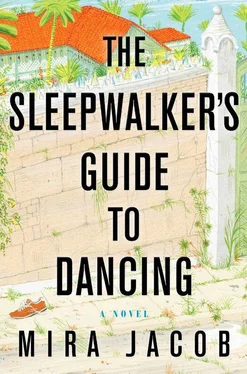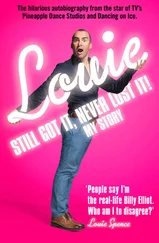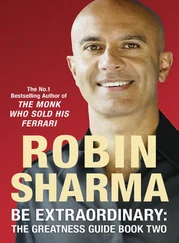“Please,” she said, sitting down next to him with the pills, and when he didn’t even acknowledge her, a voice that must have been hers screamed, “PLEASE! PLEASE! PLEASE!”
“Amina?” Kamala came running from the house. “What is it? What happened?”
“He’s not drinking!” Amina said, her voice breaking, and her mother sat next to her on the couch, taking the pills and water from her hand.
“Go,” she told Amina. “Sleep.”
That night, Thomas’s words crawled like insects into Amina’s dreams, filling them with a low, humming buzz that kept her tossing and did not fade as she woke up. It was the seventh day. Her brain hurt. If Thomas were Creation, he’d be making Man by now. Amina got up and looked out the window. He was still on the couch.
Kamala was plucking coriander leaves from the stems when she entered the kitchen.
“Did he drink anything?” Amina asked, and when her mother shook her head, it came to her finally, something so obvious and unimaginable that it clattered through her body, rearranging her bones to make space for a grief so large it felt like a new organ. She clutched the counter, panting.
Kamala was standing in front of her, saying her name, pushing her hair behind her ear. Koche , she was saying. Baby. My girl . She kissed Amina’s hands, one by one, and then each cheek, her eyes blazing. “You’re going to be okay,” she said.
But could this be Kamala? Could this be the same mother that Amina had grown up with, the unwilling immigrant, the dubious participant, the damned and damning loner? That afternoon, as Monica’s big blue sedan rolled into the driveway, Amina watched her mother hug the woman she’d barely talked to over the last twenty years, then take her by the hand and lead her into the house and down the hall.
“Thanks for calling me,” Monica said as Kamala opened the porch door.
“He’ll be so glad to see you,” Kamala said.
Whether Thomas registered Monica at all was debatable, his voice reduced to an occasional grunt, but Amina watched through the window as her father’s physician’s assistant wept, holding on to his hand, kissing his forehead as she stood up. Outside in the driveway, she handed Amina a vial of morphine.
“If he needs it,” she said, and barreled into her car and down the driveway before Amina could think of what to say.
The next to come was Anyan George, who didn’t stay long or sit at all but said some very nice things nonetheless, his hands tugging at his shirt cuffs, his eyes focused on the space above Thomas’s head.
At the end of the day Kamala led the family out to him. Bala knelt and touched his feet. Sanji kissed his cheeks and forehead. Raj whispered something sweet and rushed into his ear before fleeing back to the car. Chacko held his face between his hands like he was trying to carve it into his own memory, and Thomas looked at him, blinking. He grunted.
“What?” Chacko asked, leaning in. “What is it?”
“Later,” Thomas whispered.
Jamie hated flying. Not that he was copping to it, or even hinting at it, but it was obvious from the way he fidgeted in his seat as the plane taxied down the runway, flipping open the flight safety cards and the long-defunct ashtrays like they might contain an escape hatch.
“You want to leave?” Amina asked. “Should we just call it quits right now so you can get out while you can?”
“Yes.” Jamie closed and opened the window shade with a wince in either direction. “You know me so well.”
He lifted her hand to his face, inhaling her wrist like it was a calming agent, and Amina turned to look out the window to the shimmering runway, the barren stretch of mesa spreading out behind it for miles. It seemed ridiculous to be leaving so soon after the funeral.
“What ridiculous?” Sanji had asked when she’d said as much the night before, both of them watching Kamala scrub the courtyard bricks from the kitchen window. “You can’t miss your own show, dummy. And you’ll be back in a few days. The grief will still be here; your mother will still be here. The mess might even still be here if that bloody woman doesn’t quit driving us fifty kinds of crazy!”
Why Thomas’s departure had unleashed a cleaning frenzy in Kamala was anyone’s guess, but in the days since, she had been terrorizing every room in the house and the family right along with them. So far Raj and Chacko had beaten twenty-odd rugs while Sanji cleaned the pantry and Bala took on the fridge. And while all of them complained to Amina about being “forced into slave labor” (Sanji’s words), they also seemed to be strangely happy doing it, their hands and heads fully occupied with the work. Kamala, for her part, stalked from room to room, zealous and tyrannical. At night she slept on Thomas’s side of the bed, clutching a couch cushion like it was a flotation device.
“This is it, right?” Jamie said as the plane gathered speed. “It’s happening now?”
“Jesus, have you ever been on a plane?” Amina wrapped her hand over his clenched one.
Outside, the mesa blurred into a line of beige and the air pressed hard against them, slamming them into their seats as the plane ascended. Jamie looked pale and a little sick, his eyes shut tight as the plane banked north.
They were turning now, panning past the Sandias, the deep black-green crags and rocky faces, the ribbon of road leading to the white crest. Amina looked down on Albuquerque, the light bouncing off the sprawling tile of houses and pools, the cars running along the highways like busy insects. She imagined all of it gone, undone, erased back to 1968, when the city was nothing but eighty miles of hope huddling in a dust storm. She imagined Kamala on the tarmac, walking toward a life in the desert, her body pulled forward by faith and dirty wind.
When it takes you ten years to write a book, you have many people to thank. My immense gratitude goes to:
My husband, Jed Rothstein, for telling me when a scene wasn’t working, no matter how awkward it made dinner; my agent, Michelle Tessler, for believing in this book when it was just a handful of scenes; my best friend and partner in crime, Alison Hart, whose countless comments over the years made this smarter and sharper with every pass.
My mother, for instilling my early love of books, politics, and food; my brother, for instilling my early love of heavy metal. Also, thanks to both of you in advance for not smacking anyone who makes the regrettable mistake of thinking either of you are Kamala or Akhil. (And sorry about that.)
My family around the world, the Seattle Jacobs, the Rothsteins, the Cheriyans, the Abrahams, and the formidably charming Eliamma Thomas. My “family in this country, anyway”—the Koshy/Avasthi/Kulasinghe/Weissman/Mangalik/Kurians — most especially Anita Koshy, who provided invaluable medical expertise, and Koshy Uncle, who chased after obscure facts with the diligence of a bloodhound.
Sean Mills, who gave me a space to write and a series of great conversations when I needed them most; Jacob Chacko, who read this book and then answered more questions than any person should have to without getting a cash prize afterward.
My fantastic readers throughout the many stages of this book: Amanda McBaine, Chelsea Bacon, Joanna Yas, Alice Bradley, Karla Murthy, Sara Voorhees, Emily Voorhees, Monica Bielanko, Deborah Copaken Kogan, Noa Meyer, Garrett Carey, and Abigail Walch. Mentors Dani Shapiro, Abigail Thomas, Honor Moore, Sylvia Watanabe, Diane Vruels, and Robert Polito. David Dunbar and his City Term classes.
My editor, Kendra Harpster, for her sharp eye and enthusiasm; Susan Kamil, Karen Fink, Kaela Myers, and the entire team at Random House for their incredible efforts; Diya Kar Hazra and Helen Garnons-Williams of Bloomsbury for their thoughtfulness and input.
Читать дальше












